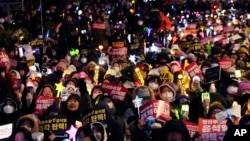The cancellation of an international forum in South Korea on Friday is feeding concerns that a carefully constructed multilateral partnership aiming at countering China could be in jeopardy if efforts to impeach President Yoon Suk Yeol are successful.
The rules-based maritime order was among the topics to have been discussed at the South Korea and Australia-hosted Indo-Pacific High-Level Forum, which has been postponed until further notice while Seoul deals with its political crisis.
The forum was to have convened government representatives from 13 countries to discuss Indo-Pacific strategies, according to a statement issued by the South Korean Foreign Ministry on December 3.
That night, Seoul was plunged into political chaos when South Korean President Yoon declared martial law and then rescinded it hours later. Opposition parties Thursday filed a second motion to impeach Yoon after a previous impeachment attempt failed.
In a televised speech Thursday, Yoon vowed to "fight to the end" while opposition parties prepared for the next impeachment vote on Saturday over what they call Yoon's "insurrectionary acts."
Uncertainty over South Korea's role
Some analysts say progress on Indo-Pacific security under Yoon's leadership, especially South Korea's ties with the Philippines and Japan, could be reversed if Yoon is forced from office, leading to the election of a new government.
"If a government comes in that is more friendly to China and is seeking to balance between the United States and the PRC [People's Republic of China], then the increased cooperation on security issues with the Philippines is likely to be downgraded," said Kenneth Weinstein, the Japan chair at Hudson Institute.
"A greater burden will absolutely fall on Japan if South Korea is doing less" in the region, and their trilateral security ties with the U.S. "can be easily reversed if a government in Seoul does not believe in the spirit of Camp David," said Weinstein.
This would be "a major blow" to U.S. efforts "to counter China's growing attempts at regional hegemony," he told VOA in a phone interview.
Yoon has gradually increased his country's role in the Indo-Pacific through close cooperation with the U.S. and Japan.
The country participated in a first-of-its-kind meeting with the United States, Australia, Japan and the Philippines in November to discuss plans for a free and open Indo-Pacific. South Korea and the Philippines upgraded their ties to a strategic partnership and agreed to bolster their defense cooperation a month earlier during Yoon's trip to Manila.
That followed a trilateral summit in August 2023 at Camp David where the U.S., South Korea and Japan agreed to align their collective efforts toward the region. The Spirit of Camp David, a joint statement issued at the summit, underscored their efforts to sustain the rules-based order in the South China Sea, where China's aggressive behavior has alarmed many of its neighbors.
The three countries signed a Trilateral Security Cooperation Framework (TSCF) in July to institutionalize their ties and a Trilateral Secretariat was established last month to implement the framework.
Challenge to US efforts on China
Daniel Sneider, a lecturer on East Asian studies at Stanford University, told VOA in a phone interview by that if the main opposition Democratic Party comes to power, it will probably "roll back the trilateral security cooperation."
He said trilateral military exercises, which are the "substantive" result of policies pursued in the last two years, are "most in danger" of being canceled if there is a change in government in Seoul.
The U.S., South Korea, and Japan held large-scale joint exercises in June and November in the East China Sea.
Yoon can be impeached with a two-thirds majority of South Korea's 300-seat National Assembly and approval by six of nine judges in the constitutional court, where there are three vacancies. In that event, the country will hold a snap election to choose a new president within 60 days.
A failed impeachment motion filed by the opposition parties last week included a paragraph criticizing Yoon for advancing close trilateral ties with Japan and the U.S. The ruling People Power Party boycotted the session, leaving it short of the necessary quorum. That paragraph was removed from the second motion filed Thursday.
Other analysts said Seoul's relations with Tokyo and Manila are unlikely to change even if there is a change of government in South Korea.
Rahman Yaacob, research fellow for Southeast Asia Program at the Lowy Institute based in Sydney, said the Trilateral Security Cooperation Framework, "has been institutionalized through the formation of the Secretariat," and that he doubts that a change of government in Seoul "will have a substantial impact on the operations of the TSCF."
Yaacob added, "Given that Manila is embarking on military modernization, I believe Seoul will continue to maintain defense cooperation with Manila, driven more by the potential of sales of military equipment and less because of the Chinese factor."
Yaacob told VOA via email that South Korea has been a critical supplier of modern military equipment to the Philippines, such as FA-50 combat aircraft for the Air Force and frigates for the Navy.
Eric Ballbach, East Asia analyst at the German Institute for International and Security Affairs based in Berlin, told VOA via email that South Korean opposition parties "acknowledge the significance of trilateral cooperation in this changed geopolitical context."
He added, "It was a smart move to institutionalize trilateral cooperation ahead" of any government change in Seoul.
Although the large-scale Indo-Pacific forum was canceled amid the upheaval, South Korea held a three-way Indo-Pacific Dialogue with the U.S. and Japan in Tokyo on Wednesday and discussed ways to strengthen stability and maritime security in the region.
Seoul also held a bilateral Indo-Pacific Dialogue with Australia on Thursday and agreed to cooperate closely on maintaining a rules-based order in the region.






